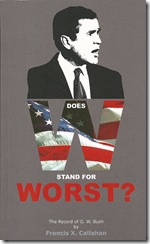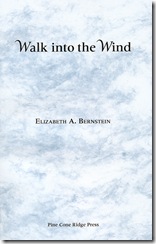Once a Republican candidate for the US Congress, Francis X. Callahan, Chico State University professor emeritus in the Department of Finance and Marketing, retired from full-time lecturing as a Senior Fellow at the National University of Singapore. Fed up with the present U.S. Administration, he has published a blistering indictment of the current President. And he calls Vice President Cheney “devious and duplicitous.” It’s clear George W. Bush will receive no Valentine this year from Frank Callahan.
“Does W Stand for Worst? The Record of G. W. Bush” ($14.95 in paperback from butterflypress@att.net or 1-866-712-8883) argues that though “corruption and incompetence” have tarnished many presidencies, “until Bush, no administration was linked to torture. No other presidency was marked by secret prisons. No previous administration stood for the abuses of Abu Ghraib and Guantanamo.”
Other presidents have made bad judgments (Lyndon Johnson with Vietnam, Nixon with Watergate, Clinton with sex, and the list goes on). But, Callahan says, “though there are historical arguments that can be made to defend Bush,” the President has taken “malfeasance,” “mismanagement” and “sheer obstinacy” to unprecedented heights (or depths). Callahan charges that Bush 43 has deprived Americans “of the benefits of scientific inquiry” (with the restrictions on stem cell research) and propagated lies “leading to the absolutely needless deaths and maiming of so many of our young men and women . . . (and) of the absolute disregard for the Constitution.”
Cheney is not the only name Callahan excoriates. Others include Donald Rumsfeld, Paul Wolfowitz, Alberto Gonzales, and infamous FEMA Director Michael Brown. “Many Americans voted for Bush in 2000 (though not as many who voted for Al Gore) and did so again in 2004, even though he was a draft dodger and shirked his National Guard duties in Texas while running against true American heroes, McCain in 2000 and Kerry in 2004.” Bush was “appointed” in 2000 by the “Gang of Five” on the Supreme Court, led by Antonin Scalia.
Callahan concludes that “no presidency has been so inept” in Bush’s “mishandling of the treasury, taxes, the military in Iraq and Afghanistan, and the disrespect for the US that he has engendered for his go-it-alone stubbornness and, truly, a frat boy so out of his depth as to cause anguish in hundreds of thousands of families.” (Callahan’s own solution to the “civil war” in Iraq is to create states, like “Sunnistan, Kurdistan and Shiastan,” like the United States, each responsible for its own security.)
Readers, of course, must judge for themselves the cogency of Callahan’s case.



